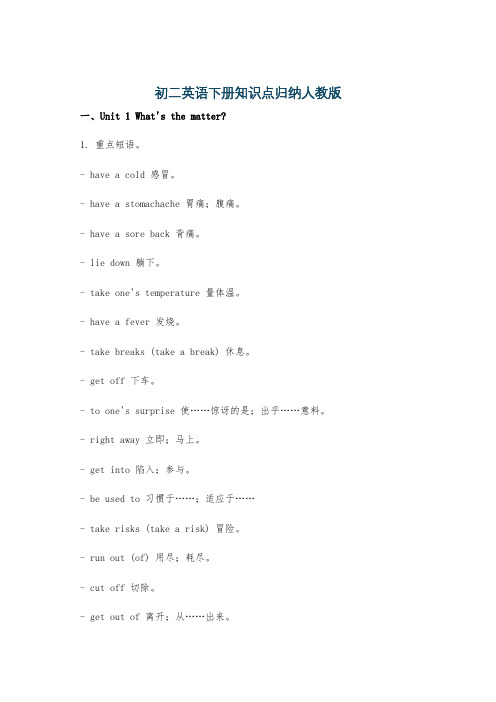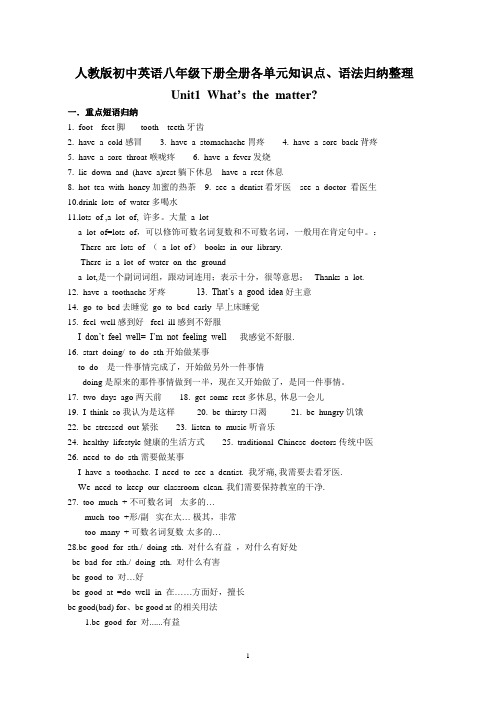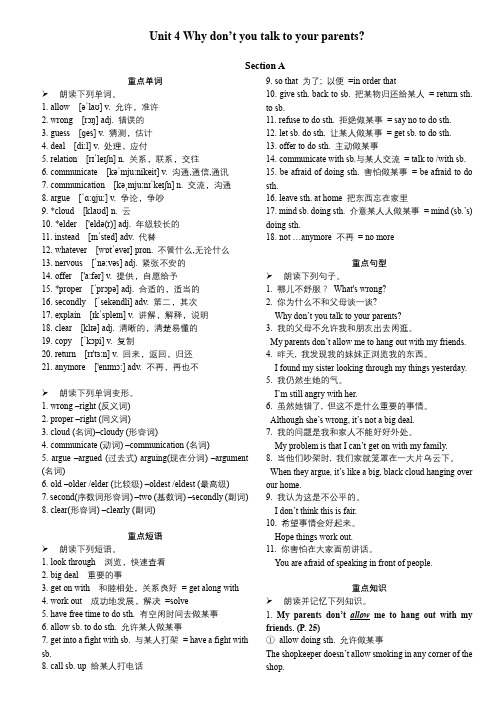八年级下册英语人教版 重点词汇短语句型总结 晨读手册
初二英语下册知识点归纳人教版

初二英语下册知识点归纳人教版一、Unit 1 What's the matter?1. 重点短语。
- have a cold 感冒。
- have a stomachache 胃痛;腹痛。
- have a sore back 背痛。
- lie down 躺下。
- take one's temperature 量体温。
- have a fever 发烧。
- take breaks (take a break) 休息。
- get off 下车。
- to one's surprise 使……惊讶的是;出乎……意料。
- right away 立即;马上。
- get into 陷入;参与。
- be used to 习惯于……;适应于……- take risks (take a risk) 冒险。
- run out (of) 用尽;耗尽。
- cut off 切除。
- get out of 离开;从……出来。
- be in control of 掌管;管理。
2. 重点句型。
- What's the matter? = What's wrong? = What's the trouble? 怎么了?- Should I put some medicine on it? 我应该在它(伤口)上敷些药吗?- You should lie down and rest. 你应该躺下休息。
- He hurt himself in P.E. class. 他在体育课上伤到了自己。
- Aron Ralston is an American man who is interested in mountain climbing. 阿伦·罗尔斯顿是一个对登山感兴趣的美国人。
3. 语法。
- 情态动词should的用法:should表示“应该”,用来提出建议或劝告,后接动词原形。
例如:You should see a dentist. 否定形式为shouldn't,例如:You shouldn't go to school late.二、Unit 2 I'll help to clean up the city parks.1. 重点短语。
人教版初中英语八年级下册全册各单元知识点、语法归纳整理

人教版初中英语八年级下册全册各单元知识点、语法归纳整理Unit1 W hat’s the matter?一.重点短语归纳1. foot---feet 脚tooth---teeth 牙齿2. have a cold 感冒3. have a stomachache 胃疼4. have a sore back背疼5. have a sore throat喉咙疼6. have a fever发烧7. lie down and (have a)rest 躺下休息have a rest 休息8. hot tea with honey 加蜜的热茶9. see a dentist 看牙医see a doctor 看医生10.drink lots of water多喝水11.lots of ,a lot of, 许多。
大量a lota lot of=lots of,可以修饰可数名词复数和不可数名词,一般用在肯定句中。
:There are lots of (a lot of)books in our library.There is a lot of water on the grounda lot,是一个副词词组,跟动词连用;表示十分,很等意思;Thanks a lot.12. have a toothache牙疼13. That’s a good idea好主意14. go to bed 去睡觉go to bed early 早上床睡觉15. feel well感到好 feel ill 感到不舒服I don’t feel well= I’m not feeling well我感觉不舒服.16. start doing/ to do sth开始做某事to do 是一件事情完成了,开始做另外一件事情doing是原来的那件事情做到一半,现在又开始做了,是同一件事情。
17. two days ago两天前18. get some rest 多休息, 休息一会儿19. I think so我认为是这样20. be thirsty口渴21. be hungry 饥饿22. be stressed out紧张23. listen to music听音乐24. healthy lifestyle健康的生活方式25. traditional Chinese doctors传统中医26. need to do sth 需要做某事I have a toothache. I need to see a dentist. 我牙痛, 我需要去看牙医.We need to keep our classroom clean. 我们需要保持教室的干净.27. too much + 不可数名词太多的…much too +形/副实在太…极其,非常too many + 可数名词复数太多的…28.be good for sth./ doing sth. 对什么有益,对什么有好处be bad for sth./ doing sth. 对什么有害be good to 对…好be good at =do well in 在……方面好,擅长be good(bad) for、be good at的相关用法1.be good for 对......有益Doing morning exercises is good for your health.做早操对你们的建康有益。
(word完整版)人教版英语八年级下册重点词组、句型及语法点汇总,文档

英语八年级下册重点词组、句型及语法点汇总Unit 1 What ’s the matter?怎么了?一、重点词组1. have a fever / cough / cold 发热 /咳嗽 /感冒2.have a toothache / stomachache牙疼 /胃疼3.have a sore back / throat背疼 /喉咙痛4.talk too much 说得太多5.drink enough water 喝足够的水6.lie down 躺下7.drink hot tea with honey 喝加蜂蜜的热茶8.see a dentist 看牙医9.get an X-ray 拍 X 光片10.take one ’ s temperature量体温11.put some medicine on sth.在上面敷药12.all weekend 整个周末13.take breaks (=take a break)休息14.in the same way 以同样的方式15.go to a doctor=see a doctor看医生16.go along 沿着走17.shout for help 大声呼救18.without thinking twice 没有多想19.get off 下车20.have a heart problem 有意脏病21.to one ’ s surprise使惊讶的;22.expect sb to do 希望某人做某事23.wait for 等待24.agree to do 赞成做某事25.thanks to 多亏了;由于29.in time 及时30.save a/one’s life 挽救生命31.help others 帮助别人32.think about 考虑;认为33.right away 立刻;立刻34.get into trouble 造成麻烦〔或烦恼〕35.fall down 跌落36.mountain climbing 登山运动37.lose one’s life 失去生命38.(be) in a difficult situation 在困境中39.by oneself 由某人自己40.run out (of) 用完;耗尽41.cut off 切除42.climb down 爬下43.get out of 走开;从出来44.make a decision=make decisions做出决定45. be in control of掌管;管理47.take risks (take a risk) 冒险二、常有搭配1.too much 太多 1> 修饰不能数名词2> 修饰动词,表示程度too many 太多修饰可数名词复数much too 太修饰形容词或副词原级2.enough “足够的 /地〞 1> 修饰名词,常置前2> 修饰形容词或副词,常置后3.need to do 需要做某事4. without doing没有做某事5.see sb doing 看见某人正在做某事see sb do 看见某人做了某事6.24-year-old 形容词,作定语,放名词前24 years old 作表语,放 be 动词后7.be/get done 被动语态8.tell sb (not) to do sth 告诉某人〔不〕要做某事9.常有的感官动词: sound, feel, smell, look, taste 1> be 动词用法,后接形容词2> 主动表被动10.have trouble = have problems 做某事有问题=have difficulties + doing11.be interested in sth/doing 对(做)某事感兴趣12.be used to sth/doing sth 习惯于某事 /做某事used to do过去/从前做某事〔现在不〕use sth to do sth 使用去做某事13.because 后接原因状语从句because of 后接名词或 doing14.be ready to do 愿意 /准备好做某事15.so that 以便与;目的是,引导目的状语从句so that 这样以致于,引导结果状语从句16.keep on doing sth. 连续或坚持做某事17.give up doing 放弃做某事18.mind doing 介意做某事三、语法点1.咨询某人的健康问运及遇到麻烦的表达方法(1)咨询某人患了何种疾病或遇到了何种麻烦时,常用以下几种结构来表达:What’ s the matter (with sb. )?〔某人〕怎么了?What’ s wrong (with sb. )?〔某人〕怎么了? What’s the trouble (with sb.)?〔某人〕出什么事了?(2)要表达身体难过或不愉快,可用以下结构:①某人 +have/has+病症 /身体部位 +ache.②某人+have/has+a+sore+发病部位.③某人 +hurt(s)+身体部位或反身代词(oneself).④某部位 +hurt(s).⑤There is something wrong with one sb/’s+部位2.神情动词 should 的用法Should 为神情动词,意为“应该;应该〞,否认式为 shouldn ’t,此后接动词原形,无人称和数的变化。
人教版八年级英语下册Unit 10 晨读本

Unit 10 I've had this bike for three years.Section A重点单词➢朗读下列单词。
1. *yard [jɑ:d] n. 院子2. *sweet [swi:t] adj. & n. 甜的,糖果3. memory [ˈmemərɪ] n. 记忆,记忆力,回忆4. *cent [sent] n. 分,分币5. *toy [tɔɪ] n. 玩具6. *bear [bɛə] n. 熊7. *maker [ˈmeɪkə(r)] n. 生产者,制造者8. *scarf [skɑ:f] n. 围巾,披巾,头巾9. *soft [sɔft] adj. 柔软的10. check [tʃek] n. & v. 餐馆账单;检查11. *board [bɔ:d] n. 板子,甲板12. *junior [ˈdʒu:nɪə(r)] adj. 地位低下的13. clear [klɪə] v. 清除,清理14. *bedroom [ˈbedru:m] n. 卧室15. own [əun] v. 拥有;有16. *railway [ˈreɪlweɪ] n. 铁路,铁道17. part [pɑ:t] v. 离开;分开18. certain [ˈsə:tn] adj. 某一,确定的,无疑的19. honest [ˈɒnɪst] adj. 诚实的,正直的20. while [wail] conj. 当...时候,一段时间,一会儿21. *truthful [ˈtru:θfl] adj. 诚实的,真实的22. hometown [ˈhəʊmtaʊn] n. 家乡,故乡➢朗读下列单词变形。
1. sale (名词)—sell (动词)2. toy (名词)—toys (复数)3. make (动词)—maker (名词)4. junior (形容词)—senior (对应词)5. own (动词)—owner (名词)6. certain (形容词)—certainly (副词)7. honest (形容词)—dishonest (反义词)—honesty (名词)8. true (形容词)—truth (名词)—truthful (形容词)—truly(副词)9. sweet –candy (同义词)—sour(对应词)10. scarf—scarfs /scarves (复数)11. hard—soft(对应词)重点短语➢朗读下列短语。
人教版八年级英语下册Unit 4 晨读本

Unit 4 Why don’t you talk to your parents?Section A重点单词➢朗读下列单词。
1. allow [əˈlaʊ] v. 允许,准许2. wrong [rɔŋ] adj. 错误的3. guess [ɡes] v. 猜测,估计4. deal [di:l] v. 处理,应付5. relation [rɪˈleɪʃn] n. 关系,联系,交往6. communicate [kəˈmju:nikeit] v. 沟通,通信,通讯7. communication [kəˌmju:nɪˈkeɪʃn] n. 交流,沟通8. argue [ˈɑ:ɡju:] v. 争论,争吵9. *cloud [klaʊd] n. 云10. *elder ['eldə(r)] adj. 年级较长的11. instead [ɪnˈsted] adv. 代替12. whatever [wɒtˈevər] pron. 不管什么,无论什么13. nervous [ˈnə:vəs] adj. 紧张不安的14. offer ['a:fər] v. 提供,自愿给予15. *proper [ˈprɔpə] adj. 合适的,适当的16. secondly [ˈsekəndli] adv. 第二,其次17. explain [ɪkˈspleɪn] v. 讲解,解释,说明18. clear [klɪə] adj. 清晰的,清楚易懂的19. copy [ˈkɔpi] v. 复制20. return [rɪ'tɜ:n] v. 回来,返回,归还21. anymore ['enɪmɔ:] adv. 不再,再也不➢朗读下列单词变形。
1. wrong –right (反义词)2. proper –right (同义词)3. cloud (名词)–cloudy (形容词)4. communicate (动词) –communication (名词)5. argue –argued (过去式) arguing(现在分词) –argument (名词)6. old –older /elder (比较级) –oldest /eldest (最高级)7. second(序数词形容词) –two (基数词) –secondly (副词)8. clear(形容词) –clearly (副词)重点短语➢朗读下列短语。
八年级下册英语各单元重点短语+句型语法 人教版

八年级下册英语各单元重点短语+句型语法人教版1. Unit 1Important phrases:- get to know: I want to get to know my new classmates.- make friends with: I hope to make friends with some local students.- be interested in: She is interested in learning a new language.- take part in: Are you going to take part in the school talent show?- show off: Don't show off in front of your friends.- be proud of: I am proud of my brother for winning the race.Sentence patterns and grammar:- Present continuous tense: He is playing football in the park.- Comparative adjectives: My sister is taller than me.- Superlative adjectives: This is the best pizza I've ever tasted.2. Unit 2Important phrases:- turn off: Don't forget to turn off the lights before you leave.- set off: We will set off for the beach early in the morning.- look forward to: I am looking forward to the schooltrip next week.- get along with: I get along with my classmates very well.- break down: Our car broke down on the way to the airport.- run out of: We ran out of milk, so I need to go to the store.Sentence patterns and grammar:- Past continuous tense: They were playing basketball when the rain started.- Modal verbs: You should study harder for the exam.- Reported speech: She said that she was going to the movies.3. Unit 3Important phrases:- be strict with: My teacher is very strict with homework deadlines.- get into: She wants to get into a good university.- take care of: Don't forget to take care of your little brother.- be good at: I am good at playing the piano.- look up to: I look up to my older sister as a role model.- come up with: We need to come up with a plan for the project.Sentence patterns and grammar:- Future perfect tense: By next year, I will havefinished high school.- Present perfect continuous tense: She has been studying English for five years.- Conditional sentences: If I had known, I would have helped you.4. Unit 4Important phrases:- call for: This situation calls for a serious discussion.- hold on: Please hold on while I transfer your call.- look out: Look out for the car coming down the road.- put off: Don't put off until tomorrow what you can do today.- try out: I want to try out for the school basketball team.- fall apart: Our friendship fell apart after the argument.Sentence patterns and grammar:- Present perfect tense: I have finished my homework.- Past perfect tense: She had already left when I arrived.- Passive voice: The cake was made by my mom.5. Unit 5Important phrases:- set up: We need to set up the equipment for the presentation.- take off: The plane will take off in an hour.- go through: I will go through my notes before the exam.- look into: The police will look into the matter.- pick up: Can you pick up some milk on your way home?- be satisfied with: I am satisfied with my test results.Sentence patterns and grammar:- Future continuous tense: They will be having dinner at7 PM.- Reported questions: He asked her where she was goingfor the holidays.- Relative clauses: The boy who won the race is my friend.6. Unit 6Important phrases:- be proud of: She is proud of her achievements.- look after: My sister looks after our pet dog.- give up: Don't give up on your dreams.- make a decision: I need to make a decision about which college to attend.- put up with: I can't put up with his behavior any longer.- take after: My son takes after his father in terms of looks.Sentence patterns and grammar:- Past perfect continuous tense: She had been studying all night when her parents arrived.- Reported commands: He told her to clean her room.- Adverb clauses: I will call you when I get home.。
人教版八年级英语下册Unit 2 晨读本

Unit 2 I’ll help to clean up the city parks.Section A重点单词➢朗读下列单词。
1. cheer [tʃiə] v. 欢呼2. volunteer [ˌvɔlənˈtiə] n. & v. 志愿者;义务做3. sign [saɪn] n. 标记,符号,标牌4. notice [ˈnəʊtɪs] n. & v. 通知,公告;注意到5. lonely ['ləʊnlɪ] adj. 孤独的,寂寞的6. several [ˈsevrəl] prep. 几个,数个,一些7. strong [strɒŋ] adj. 强壮的,强烈的8. feeling [ˈfi:lɪŋ] n. 感觉,感触9. *satisfaction [ˌsætɪs'fækʃn] n. 满足,满意10. joy [dʒɔɪ] n. 高兴,愉快11. owner [ˈəʊnə(r)] n. 所有者,物主12. *journey ['dʒɜ:nɪ] n. (尤指长途)旅行,行程13. *raise [reɪz] v. 抬起,举起,筹集,征集14. alone [əˈləun] adv. 独自地,孤独地➢朗读下列单词变形。
1. clean (动词)—clean(形容词)—cleaner(名词)清洁工—tidy(同义词)2. strong—weak(反义词)3. feel(动词)—feeling(名词)—felt(过去式)4. own(动词)—owner(名词)—own(形容词)自己的5. raise –raising(现在分词) –raised(过去式)6. satisfy(动词) –satisfaction(名词)—satisfied(形容词)重点短语➢朗读下列短语。
1. clean up 打扫(清除)干净2. give out 分发,散发=hand out3. cheer up 变得更高兴,振奋起来4. come up with 想出,提出=think of5. put off 推迟6. hand out 分发hand in(反义词)7. call up 打电话给…某人,征召=ring up8. used to 曾经…,过去…9. care for 照顾,非常喜欢=look after =take care of10. try out 参加…选拔,试用11. help out with sth. 帮助解决困难12. at the age of 在……岁时13. make a plan 制订计划14. work for 为……工作;为……效力15. put up 建造;举起;张贴16. at least 至少17. come true 实现18. at the same time 同时19. be worried about 担心=worry about20. in one’s free time 在某人的业余时间21. raise money 筹钱;募捐重点句型➢朗读下列句子。
人教版八年级英语下册Unit 1晨读材料及听写

Unit 1 What’s the matter?Section A重点单词➢朗读下列单词。
1. matter [ˈmætə] v. 重要,要紧,有关系2. *sore [sɔ:(r)] adj. 疼痛的,酸痛的3. *stomach ['stʌmək] n. 胃,腹部4. *stomachache ['stʌməkeɪk] n. 胃痛,腹痛5. foot [fu:t] n. 脚6. *neck [nek] n. 颈,脖子7. *throat [θrəʊt] n. 喉咙8. fever ['fi:və] n. 发烧,发热9. lie [laɪ] v. 躺,平躺10. rest [rest] n. 剩余部分,其余;放松,休息11. *cough [kɒf] n. & v. 咳嗽12. *X-ray ['eksreɪ] n. X光,X射线13. *toothache [ˈtu:θeɪk] n. 牙痛14. *headache [ˈhedeɪk] n. 头痛15. break [breɪk] n. & v. 休息,暂停;打破16. hurt [hə:t] v. 伤害,损害,使受伤17. *passenger ['pæsɪndʒə] n. 乘客,旅客18. off [ɒf] adv. prep. 离开(某处);从…去掉19. onto [ˈɒntə] prep. 向,朝20. trouble [ˈtrʌbl] n. 麻烦,烦扰,问题21. hit [hit] n. & v. 碰撞,打,打击22. herself [hə:ˈself] pron. 她自己,她本身➢朗读下列单词变形。
1. foot – feet (复数)2. lie – lying (现在分词)—lay (躺) lied (撒谎) (过去式)3. hurt – hurt(过去式)4. she (主格) –herself(反身代词)– her (物主代词)5. hit – hit (过去式) —hitting (现在分词)6. passenger –passengers (复数)7. tooth –toothache(名词)牙痛– teeth(复数)牙齿8. stomach –stomachs (复数)9. break –broke (过去式)重点短语➢朗读下列短语。
- 1、下载文档前请自行甄别文档内容的完整性,平台不提供额外的编辑、内容补充、找答案等附加服务。
- 2、"仅部分预览"的文档,不可在线预览部分如存在完整性等问题,可反馈申请退款(可完整预览的文档不适用该条件!)。
- 3、如文档侵犯您的权益,请联系客服反馈,我们会尽快为您处理(人工客服工作时间:9:00-18:30)。
Unit 1What's the matter?Section A重点单词1.matter n.问题;事情2.sore adj.疼痛的;酸痛的3.stomachache n.胃痛;腹痛拆分记忆法:stomach+ache4.foot n.脚;足5.neck n.颈;脖子6.stomach n.胃;腹部7.throat n.咽喉;喉咙8.fever n.发烧9.lie v.躺;平躺10.rest v.& n.放松;休息11.cough n.& v.咳嗽12.Xray n.X射线;X光13.toothache n.牙痛拆分记忆法:tooth+ache14.headache n.头痛拆分记忆法:head+ache15.break n.间歇;休息16.hurt v.(使)疼痛;受伤17.passenger n.乘客;旅客18.off ad v.& prep.离开(某处);不工作;从……去掉19.onto prep.向;朝20.trouble n.问题;苦恼21.hit v.(用手或器具)击;打22.herself pron.(she的反身代词)她自己词形变换1.foot—feet(复数)2.stomach—stomachs(复数)3.lie(躺)—lay(过去式)—lying(现在分词)4.hurt—hurt(过去式)5.hit—hit(过去式)6.she(主格)—herself(反身代词)重点短语1.have a cold感冒2.have a stomachache胃痛3.lie down躺下4.take one's temperature量体温5.have a fever发烧6.take breaks(take a break)休息7.get off下车8.to one's surprise使……惊讶的是;出乎……的意料9.right away立即;马上10.talk too much说得太多11.drink enough water喝足够的水12.have a very sore throat嗓子非常疼13.drink some hot tea with honey喝一些加蜂蜜的热茶14.see a dentist看牙医15.get an Xray拍X光片16.put some medicine on…在……上面敷一些药17.feel very hot感到很热18.sound like听起来像19.all weekend整个周末20.in the same way以同样的方式21.go to a doctor看医生22.go along沿着……走23.on the side of the road在路边24.shout for help大声呼救25.without thinking twice没有多想26.have a heart problem患心脏病27.thanks to多亏了;由于28.in time及时29.save a life挽救生命30.get into trouble陷入麻烦31.hurt oneself伤到自己32.fall down落下;摔倒重点句型1.你怎么了?What's the matter with you?=What's the trouble with you?=What's wrong with you?2.她昨天说话太多,并且没喝足够的水。
She talked too much yesterday and didn't drink enough water.3.他应该躺下休息。
He should lie down and rest.4.我想我以同一种方式坐了太长时间没动。
I think I sat in the same way for too long without moving.5.你需要远离电脑休息。
You need to take breaks away from the computer.6.司机看见一位老人正躺在路边。
The driver saw an old man lying on the side of the road.7.二十四岁的司机王平,没有多想就停下了车。
The bus driver,24yearold Wang Ping, stopped the bus without thinking twice.8.但是使他吃惊的是,他们都同意和他一起去。
But to his surprise, they all agreed to go with him.9.多亏了王先生和乘客,医生及时挽救了那个人。
Thanks to Mr.Wang and the passengers, the man was saved by the doctors in time.10.你踢足球伤了你自己吗?Did you hurt yourself playing soccer?Section B重点单词1.sick adj.生病的;有病的同义词记忆法:ill2.knee n.膝;膝盖3.ourselves pron.(we的反身代词)我们自己拆分记忆法:our+selves4.climber n.登山者;攀登者拆分记忆法:climb+er5.risk n.& v.危险;风险;冒险6.situation n.情况;状况7.kilo(=kilogram) n.千克;公斤8.rock n.岩石9.knife n.刀10.blood n.血11.mean v.意思是;打算;意欲12.importance n.重要性;重要比较记忆法:important(adj.)13.decision n.决定;抉择比较记忆法:decide(v.)14.control n.& v.限制;约束;管理15.spirit n.勇气;意志16.death n.死;死亡比较记忆法:die(v.)dead(adj.)17.nurse n.护士词形变换1.sick—ill(同义词)2.we(主格)—ourselves(反身代词)—us(宾格)3.breathe(动词)—breath(名词)4.climb(动词)—climber(名词)攀登者5.kilogram—kilo(缩写形式)6.run—ran(过去式)—running(现在分词)7.knife—knives(复数)8.cut—cut(过去式)—cutting(现在分词)9.mean(动词)—meaning(名词)—meant(过去式)10.importance(名词)—important(形容词)11.decide(动词)—decision(名词)12.die(动词)—death(名词)—dying(现在分词)—died(过去式)—dead(形容词)重点短语1.be used to习惯于……;适应于……2.take risks(take a risk)冒险3.run out(of)用尽;耗尽4.cut off切除5.get out of离开;从……出来6.give up放弃7.be in control of掌管;管理8.put a bandage on…用绷带包扎……9.get hit on the head撞到头部10.feel sick感到恶心11.have problems breathing呼吸困难12.mountain climbing登山运动13.in a difficult situation在困境中14.keep on doing sth.继续(或坚持)做某事15.make a decision做出决定16.be interested in对……感兴趣17.mean doing sth.意味着做某事18.lose one's life失去生命19.the importance of………的重要性20.be ready to do sth.准备好做某事重点句型1.有人撞到头了。
Someone got hit on the head.2.他不想那天死去。
He was not ready to die that day.3.他呼吸困难。
He has problems breathing.4.作为一位登山者,阿伦习惯于冒险。
As a mountain climber,Aron is used to taking risks.5.他用左臂把自己包扎好,以便不会失血过多。
With his left arm, he bandaged himself so that he would not lose too much blood.6.他是如此酷爱爬山,以至于即使在这次经历之后,他还是继续爬山。
His love for mountain climbing is so great that he kept on climbing mountains even after this experience.Unit 2I'll help to clean up the city parks.Section A重点单词1.cheer v.欢呼;喝彩2.volunteer v.义务做;自愿做n.志愿者3.sign n.标志;信号4.notice n.通知;通告;注意v.注意到;意识到5.lonely adj.孤独的;寂寞的比较记忆法:alone(ad v.)6.several pron.几个;数个;一些7.strong adj.强烈的;强壮的8.feeling n.感觉;感触拆分记忆法:feel+ing9.satisfaction n.满足;满意联系记忆法:satisfied(adj.)10.joy n.高兴;愉快11.owner n.物主;主人12.journey n.(尤指长途)旅行;行程13.raise v.募集;征集14.midnight n.午夜;子夜拆分记忆法:mid+night15.alone ad v.独自;单独词形变换1.feeling(名词)—feel(动词)2.owner(名词)—own(形容词)自己的—own(动词)拥有3.satisfaction(名词)—satisfied(形容词)4.alone(副词)—lonely(形容词)5.joy(名词)—joyful(形容词)重点短语1.clean up打扫(或清除)干净2.cheer up(使)变得更高兴;振奋起来3.give out分发;散发4.come up with想出;提出(主意、计划、回答等)5.put off推迟6.hand out分发7.call up打电话给(某人);征召8.used to曾经……;过去……9.care for照顾;非常喜欢10.try out参加……选拔;试用11.CleanUp Day清洁日12.an old people's home养老院13.help out with sth.帮助解决某事14.the look of joy快乐的表情15.at the age of在……岁时16.make a plan制定计划17.make some signs制作一些公告牌18.work for为……工作;为……效力19.put up建造;举起;张贴20.for example比如;例如21.raise money募钱;募捐22.at least至少23.come true实现24.at the same time同时25.be worried about担心26.in one's free time在某人的业余时间重点句型1.这个男孩可以在食品救济站分发食物。
